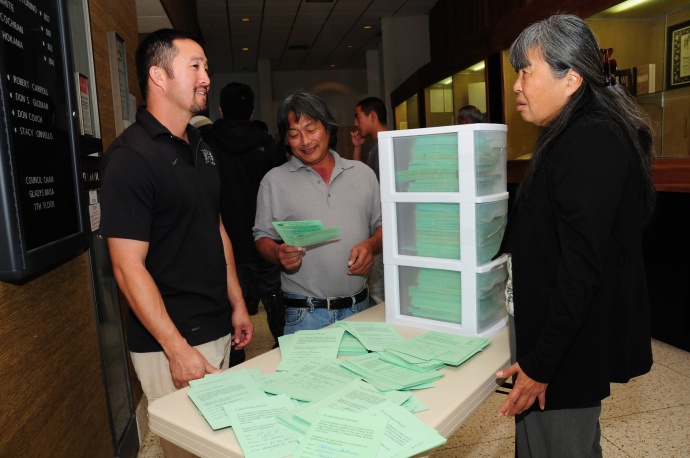Petitions Filed For and Against Maui Pesticide/GMO Bill
By Wendy Osher
A bill that seeks to implement disclosure and use restrictions on pesticides and Genetically Modified Organisms in Maui County was introduced before the Council’s Policy and Intergovernmental Affairs Committee today.
Testimony started at 9 a.m. on Tuesday morning, Jan. 28, and concluded at 4:30 p.m.
The bill, introduced by Council Member Elle Cochran of West Maui would establish mandatory disclosure requirements for commercial agricultural entities that purchase or use certain quantities of pesticides or possess genetically modified organisms.

Elle Cochran introduced the pesticide and GMO bill. Testimony lasted into the afternoon before the Policy and Intergovernmental Affairs Committee. The testimony was carried live on Akakū Community Television Ch. 53.
The bill would also establish provisions governing the use of pesticides by requiring the creation of pesticide buffer zones, and establish penalties to implement the measure.
Concerned farmers and ranchers have dubbed the measure as an “anti-agriculture bill,” a “harassment bill” and “over-burdensome,” while supporters of the restrictions say the disclosure bill is a “common sense measure” that would provide neighborhood notifications and buffer zones to help address health concerns.
Nearly 2,500 Maui County residents signed petition cards expressing their opposition to the bill being considered, according to Maui County Farm Bureau Executive Director Warren Watanabe.
Meantime, Maui resident Karen Chun was among those who testified in favor of the bill in which she delivered a petition that contained 686 Maui County members wanting disclosure of GMOs and pesticide use. According to Chun, a total of 1,428 individuals across the internet signed the online petition at the time it was submitted to the Committee.

Kurt Yamamura, an HC&S employee; Warren Watanabe, from the Maui County Farm Bureau; and Mae Nakahata, an HC&S agronomist were among those in attendance at the committee hearing on Tuesday. The green cards shown are petitions signed by residents in opposition to the bill.
Some of those who testified against the measure said they are worried that if it the bill passes, it will force struggling local farms to shut down.
“Farmers already face numerous challenges and work very hard to comply with stringent state and federal laws. Adding a ridiculous new layer of regulations at the county level will kill off some of our farms,” said MCFB director Watanabe.
Watanabe said the bill ignores state and federal regulations governing GMOs and pesticide use, and if passed, would require “significant taxpayer dollars” to enforce.
Chun, who filed the petition in support of the bill said, “This is not a regulatory bill. This is a disclosure bill.”

Maui resident Karen Chun was among those who testified in favor of the bill. She delivered a petition that contained signatures from 686 Maui County members wanting disclosure of GMOs and pesticide use. There were a total of 1,428 individuals that signed the online petition at the time it was submitted. File photo courtesy Jackie Peterson.
Chun, who has an ongoing case regarding the alleged pesticide use near her home filed a report in June 2013 alleging she could smell and taste the chemicals being used in fields near her home.
“I would have liked to have been notified promptly,” she said suggesting that an app be created for farmers to use in which they can enter their name, the date, and the product used.
“That’s notification, that’s recording, that’s the whole thing in one. It takes five minutes for the farmer; it takes no money; it’s easy; and I volunteer to do it for free,” said Chun.
Farmer Darrell Tanaka who owns an orchid nursery in Haʻikū called the measure a “harassment bill,” saying the stringent requirements in the bill makes it difficult to reasonably farm.
“I don’t use restricted-use pesticides, but what this bill is in reality is an attack even on general-use pesticides, which is an attack on farming. If I cannot spray, I’m out of business and I lose my home. It all depends on what crop you have, what climate you live in, what pests you are faced with — that determines what and when you have to spray,” said Tanaka.
“How are you going to have somebody declare a week ahead of time what they intend to spray when they didn’t go out to their fields to check what pests they have. If I find a pest in my nursery this morning, I’m going to spray this afternoon for that specific pest,” he said.
Among those who spoke in favor of the measure was Maui resident Irene Bowie who testified on behalf of the Maui Tomorrow Foundation saying, “The community demands that sustainable and safe 21st century farm practices that protect human health and the environment be implemented. And we ask the council members to take common sense measures to ensure this.
“In particular, we support neighbor notification of field spraying and buffer zones. Advanced notice allows the public to take precautions to avoid exposure such as keeping children and pets inside, closing windows, and covering vegetable gardens and grills.”
Bowie called notification “a commons sense measure” saying it “gives the public the right to know when and what they may be exposed to, and giving community members the means to protect themselves and loved ones from possible harm.”
Mae Nakahata, the agronomist for the Hawaiian Commercial and Sugar Company called the bill an “anti-ag measure,” saying it is strongly opposed by HC&S, a company that has been growing sugar cane since 1865.
“We do not mind notification, however, if the notification will be used to file complaints that we constantly have to defend ourselves, that is where the problems happen. Same thing with buffers — we find that people dump things in these areas, and it does take out in our estimate now over 1,000 acres of our lands,” said Nakahata.
“Farmers tell us they can’t farm without chemicals, but how do you explain humans farming for over 10,000 years without chemicals,” one Makawao resident stated in testimony supporting the bill.
The meeting recessed at 4:30 p.m. with no legislative action taken.
Committee Chair Riki Hokama said the continuation of testimony will begin at 9 a.m. on Friday, Jan. 31.
If an individual has already given oral testimony, they may not sign up for re-testimony at Friday’s meeting. Those who have not testified thus far will still have the opportunity to sign up to testify on Friday prior to the start of the meeting.








_1768613517521.webp)

